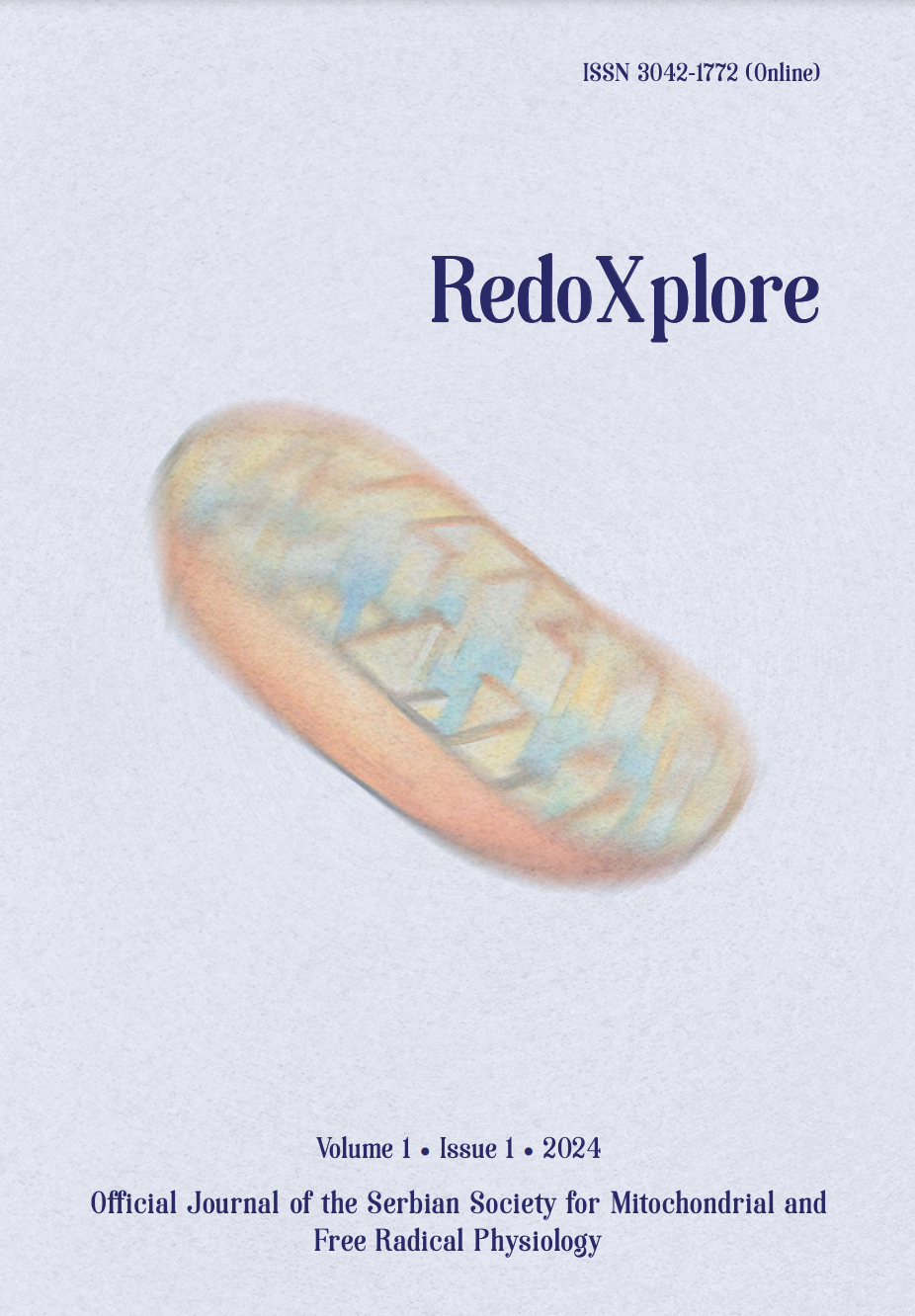
More articles from Volume 1, Issue 1, 2024
REDOX AND METABOLIC REPROGRAMMING OF BREAST CANCER CELLS AND ASSOCIATED ADIPOSE TISSUE - THE CORNERSTONES OF ADAPTIVE TUMOUR BEHAVIOUR
INSULIN MODULATES MITOCHONDRIAL STRUCTURAL AND FUNCTIONAL MOSAICISM IN BROWN ADIPOCYTES
NITRITE MITIGATES OXIDATIVE BURST IN ISCHEMIA/REPERFUSION IN BRAIN SLICES
NITRIC OXIDE, SUPEROXIDE AND PEROXYNITRITE – REDOX REGULATION OF THE CARDIOVASCULAR SYSTEM BY NITRO-OXIDATIVE STRESS AND S-NITROS(YL)ATION
DIETARY NITRATE AS PIVOT ON THE GUT MICROBIOTA-HOST REDOX COMMUNICATION
Citations

0
MITOCHONDRIAL TRANSLATION IS THE PRIMARY DETERMINANT OF SECONDARY MITOCHONDRIAL COMPLEX I DEFICIENCIESv
Laboratory of Bioenergetics, Institute of Physiology, Czech Academy of Sciences , Prague , Czechia
Department of Biomedical Sciences, University of Padua , Padova , Italy
Veneto Institute of Molecular Medicine , Padua , Italy
Institute of Physiology, Laboratory of Bioenergetics, Czech Academy of Sciences , Prague , Czechia
Laboratory of Bioenergetics, Institute of Physiology, Czech Academy of Sciences , Prague , Czechia
Department of Physiology, Faculty of Science, Charles University , Prague , Czechia
Laboratory of Bioenergetics, Institute of Physiology, Czech Academy of Sciences , Prague , Czechia
Laboratory for Study of Mitochondrial Disorders, First Faculty of Medicine, Charles University , Prague , Czechia
Laboratory of Bioenergetics, Institute of Physiology, Czech Academy of Sciences , Prague , Czechia
Department of Biomedical Sciences, University of Padua , Padova , Italy
Veneto Institute of Molecular Medicine , Padua , Italy
Department of Physiology, Faculty of Science, Charles University , Prague , Czechia
School of Pharmacy and Medical Science, Griffith University , Brisbane , Australia
Laboratory of Molecular Therapy, Institute of Biotechnology, Czech Academy of Sciences , Prague , Czechia
Department of Pediatrics and Inherited Diseases, First Faculty of Medicine, Charles University , Prague , Czechia
Laboratory of Bioenergetics, Institute of Physiology, Czech Academy of Sciences , Prague , Czechia
Laboratory of Bioenergetics, Institute of Physiology, Czech Academy of Sciences , Prague , Czechia
Laboratory of Bioenergetics, Institute of Physiology, Czech Academy of Sciences , Prague , Czechia
Editor: Bato Korac
Published: 29.08.2024.
Keynote lectures
Volume 1, Issue 1 (2024)
Abstract
Individual complexes of the mitochondrial oxidative phosphorylation system (OXPHOS) are not linked solely by their function; they also share dependencies at the maintenance/assembly level, where one complex depends on the presence of a different individual complex. Despite the relevance of this ‘interdependence’ behavior for mitochondrial diseases, its true nature remains elusive. To understand the mechanism that can explain this phenomenon, we examined the consequences of the aberration of different OXPHOS complexes in human cells. We demonstrate here that complete disruption of each of the OXPHOS complexes resulted in a perturbation in energy deficiency sensing pathways, including the integrated stress response (ISR) pathway. The secondary decrease of complex I (cI) level was triggered by both complex IV and complex V deficiency, and it was independent of ISR signaling. On the other hand, we identified the unifying mechanism behind cI downregulation in the downregulation of mitochondrial ribosomal proteins and, thus, mitochondrial translation. We conclude that the secondary cI defect is due to mitochondrial protein synthesis attenuation, while the responsible signaling pathways could differ based on the origin of the OXPHOS defect.
Citation
Copyright

This work is licensed under a Creative Commons Attribution-NonCommercial-ShareAlike 4.0 International License.
Article metrics
The statements, opinions and data contained in the journal are solely those of the individual authors and contributors and not of the publisher and the editor(s). We stay neutral with regard to jurisdictional claims in published maps and institutional affiliations.






